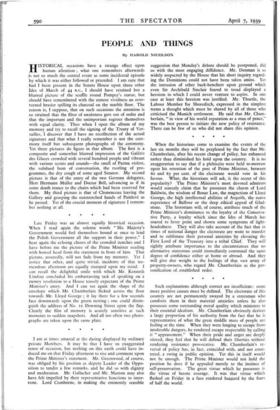When the historians come to examine the events of the
last six months they will be perplexed by the fact that Mr. Chamberlain, after his recent change of policy, has enhanced rather than diminished his hold upon the country. It is no exaggeration to say that if a plebiscite were held to-morrow upon his retention of the post of Prime Minister, between 6o and 65 per cent. of the electorate would vote in his favour. What, the historians will ask, is the secret of this popularity? The Prime Minister's most devoted admirers would scarcely claim that he possesses the charm of Lord Baldwin, the wisdom of Sonar Law, the magnetism of Lloyd George, the high intellectual abilities of Asquith, the suave experience of Balfour or the deep ethical appeal of Glad- stone. The historians will, of course, attribute much of the Prime Minister's dominance to the loyalty of the Conserva- tive Party, a loyalty which since the Ides of March has soared to fever point and shown some symptoms of light- headedness. They will also take account of the fact that in times of national danger the electorate are wont to transfer and to sublimate their personal anxieties by elevating the First Lord of the Treasury into a tribal Chief. They will rightly attribute importance to the circumstances that no alternative statesman could immediately command the same degree of confidence either at home or abroad. And they will give due weight to the feelings of that vast army of property-owners, who regard Mr. Chamberlain as the per- sonification of. established order.










































 Previous page
Previous page